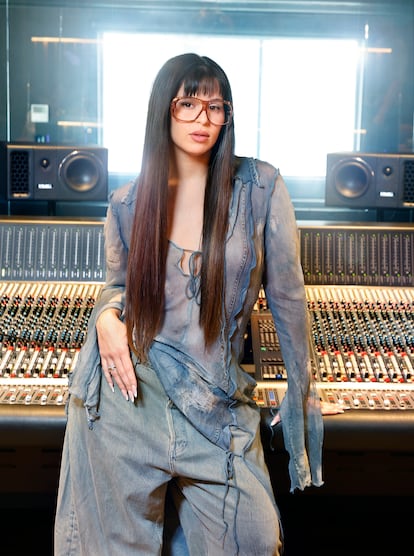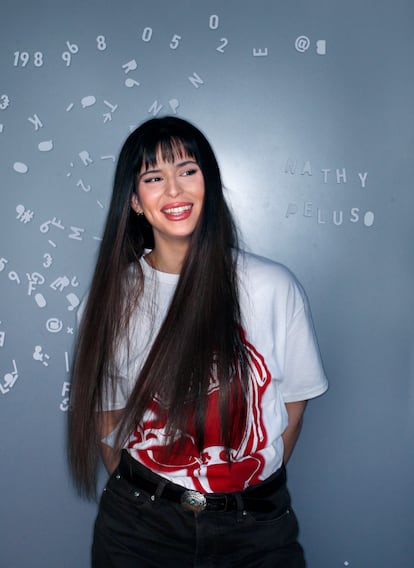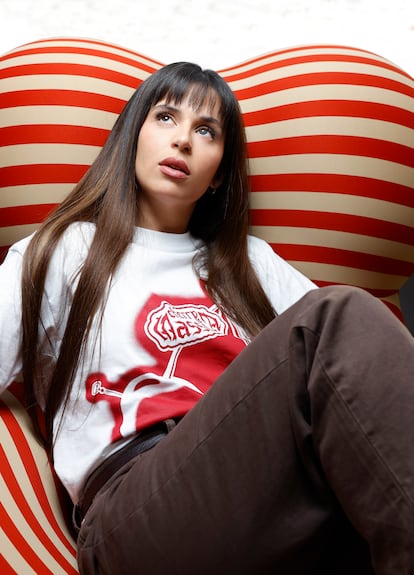Nathy Peluso: ‘We women can only take care of ourselves. Men have to learn to live with our power’
The rap star who got her break on YouTube has a Latin Grammy to her name. She has made a hallmark out of unexpected, audacious and continuous changes. Now she’s back with a new identity and a new album: ‘Grasa’

Wearing glasses and hardly any makeup, Nathy Peluso, 29, enters shyly, like a little girl — a far cry from the powerful singer who reemerges for the photo shoot. She lives between Barcelona — where “there is space to be calm” — and the “more frenetic” Madrid. She grew up in the Buenos Aires neighborhood of Saavedra, in Argentina, and as a teenager emigrated to Torrevieja, a coastal town in eastern Spain. There she cut her teeth singing Frank Sinatra and Nina Simone songs in hotels. She writes, composes, designs and creates urban, demanding and empowering music. In Grasa, she explores, for the first time, her sensitive side. We press play, and while the songs from the album play, we talk with the Argentine star about what we hear and don’t hear on the record.
Q. “A bitch, surprising, curvy and eloquent / magnificently colossal, extravagant and animalistic.” Is that so?
A. It is the rawest part of my nature. But my personality has very different facets.
Q. “I’m not here to please anyone. I’m here to stir something.” Stir what?
A. An artist’s job is to shake up cultural and personal foundations. As uncomfortable as it may be. I’ve always had to make an extra effort to fit in. My character takes its toll on me. But I feel power within me. And I think it is my mission to spread that strength to people.
Q. Do you need strength because at some point you lacked it?
A. I feel that the condition of life that I got handed (my parents, my roots...) gave me no chance to not be strong. Of course there are times when I feel broken, but, when it seems that there is nothing left, I find strength where there is none.
Q. There are videos of you as girl dancing with lipstick on. Were you being prepared to be an artist?
A. The more I grow up, the clearer I see it: my parents are artists.
Q. Your father is a psychologist and your mother teaches English.
A. Beyond what they do, they are writers. The way they speak and write has carried over. I have been stimulated when it comes to expressing myself.
Q. You sold instant poems at Madrid’s flea market El Rastro.
A. Writing poems at will with the Olivetti typewriter to sell them, I realized that I could make songs.
Q. At the age of 16, you sang in hotels in Torrevieja. You charged €50 ($54) for four hours.
A. Nina Simone, Ella Fitzgerald... I learned by trying to imitate.
Q. From there, you moved to the mournful rap of your first album: “You make my rage come out.”
A. I was releasing songs on YouTube until Corashe led to an exposure that got me my audience.
Q. Visceral/vulnerable. Violent/sensual. What’s behind these changes?
A. They are a gateway to getting to know me. I get tired of myself quickly. I am very productive, I like to challenge myself and constantly grow. If I continue with something that already works, I feel like I’m wasting my time to become a better artist. My personality has an extreme duality. The same passion I have about showing my strength I also have when it comes to showing my love and my vulnerability. I feel that what characterizes me is that everything I feel, and show, is strong.
Q. Does the need to show strength denote weakness?
A. Today I don’t need to show it. Maybe at the time it was to defend myself. But I’m like that: histrionic, exaggerated.
Q. What is the price of always pushing yourself to the limit?
A. Exhaustion. But it is my artistic condition, the driving force of my life. I didn’t want to be a pop star and fill stadiums, just to be in contact with art. When someone is moved by what you are doing, you feel like you have a job in the universe.
Q. As an Argentine citizen, is your rebellion more personal than political?
A. My way of defending a broad and plural world, of provoking and making people think, is to stir emotions with my music. Conversations are also triggered there because, politically, I am very ignorant. I think I contribute when I get emotional. What changes us is art.
Q. Does the music industry allow you to make art?
A. I like to think I infiltrated it. I feel that what is popular needs to be brought closer to the things that may not be part of what is commercial.
Q. You have even changed physically.
A. I cut my hair [in March 2022] for aesthetic reasons. But it took me to a very complicated time in my life, of internal search, of dysphoria, of having to rediscover myself.
Q. What brings you to that state?
A. I am interested in very few things with great intensity: my profession, which is my purpose in the world, and love. Love of a man, my family, loved ones.
Q. In Mafiosa, you sing, “Not just anyone approaches me, I know / they say you have to have guts to eat me.”
A. Mafiosa is the anthem of a stage in my life that identifies the powerful women who many men distance themselves from.
Q. What scares men?
A. The power? They scare easily. How seductive is it to see someone confident in themselves... If that pushes someone away, it’s because they probably have to work on themselves. Let them work in therapy and we will meet them later. I love the intensity.
Q. The song continues: “What the fuck happens to men when it comes to a woman?”
A. It is a conversation about women’s present. We haven’t solved anything at all yet. But the only thing we can do is take care of ourselves. And for men to learn to live with our power. Our security and independence must be part of our culture. Of course there are great men. People who are in a process of insecurity are on the path to understanding something. I caricature it. I like to be histrionic with society’s problems because part of art is brutally exposing things. But I’m also very compassionate.
Q. You said: “Suddenly I found that I was allowed to be imperfect and that had value.” Have we ever thought that someone can be perfect?
A. My imperfection makes me unique. It is my source of power. We are unique beings. But you have to be brave and work hard on your self-knowledge to embrace that difference. I detected it when I was little and it helped me develop professionally.
Q. You talk about an almost idyllic childhood.
A. I am an immigrant, how idyllic…
Q. Very loved by her parents.
A. The idyllic is created in memories and my parents were in charge of creating those memories. We had a lot of very difficult situations like all families. But what remains is positive because there was love. And love dyes everything a beautiful color. You see? Knowing how to receive and give love is strength.
Q. Did you get to know yourself on your own?
A. I am a very demanding person with myself. I feel that any situation in life is a learning experience. I analyze myself a lot. And I do a lot of therapy. I love it, like the good Argentine that I am. It is a tool that maximizes the juice you can get out of each experience. But you have to have that drive. Sometimes you don’t feel like working on yourself that much.
Q. “I have my complexes. Sometimes I think I’m very hot. Sometimes not.”
A. I’m learning to live with my ups and downs. Acceptance is a lifelong job.
Q. Learn to love, says one of your new songs.
A. That song is a message for me and for everyone.
Q. Does it imply that at some point you did not love yourself?
A. Yes. It seems healthy to me, sometimes, to have those disagreements. If you work to find yourself again, you do it harder. I think it is a reflection of our society. We need to learn to love in another way. There is a lack of love. We have prioritized other things. It seems that we only know how to make profit. There is a lot of good that makes us grow as a society. But I also feel that we are moving away from what is crucial. We are very distracted. Love is a great defense that we have to develop.
Q. In the song Aprender a amar (Learning to Love) you talks about your self-demanding side. Is a vocation an obsession?
A. I am obsessed with being the best version of myself. I’m not content if I don’t give 100%.
Q. “Get up, bitch, there’s no time,” you say.
A. That song lifts me up. It’s like your mother telling you: “Come on, come on, there’s no time to break down.”
Q. “Even if I get everything, I always want more.”
A. I want to do something beyond my ego, something that transcends. My quest is not to be dominated by that ambition. I want what I do to be useful to other people. But I have no ambition for the tangible.
Q. You have money.
A. Obviously. I already went through that struggle. Having more or less money is not a problem for me. I’m ready. My goal is to improve myself. The money is going to come. If you do what you have to do, things work out. I never stop improving myself and testing myself — that is the engine that drives everything.
Q. You say money is going to come. What will someone who is unemployed think?
A. I know hardness, it is part of life’s learning. I remember what it’s like to work almost like a slave. And, although sacrifice has a reward, we are all kind of slaves in this capitalist-consumer system. We are forced to constantly produce and we do not have space to understand and get to know each other.
Q. You name Versace in your songs (Corashe) and design for the Spanish brand Desigual. Aren’t you celebrating that consumerism?
A. I am not a consumerist person, but I live with the fashion industry. Luxury is a reality that I was unaware of and have got to know. It gives you comfort. I am a hedonist: I like to live surrounded by pleasures, but luxury is not in the Versace bag. It’s about opening it and having the person you love calling you.
Q. Are you in love?
A. No.
Q. Given you are more and more famous, how would someone approach you?
A. It will happen when it happens. It’s one of the best things in the world. I would love to have a life partner. Children? I don’t know.
Q. “The fear of making someone uncomfortable is a restriction on your freedom.”
A. I don’t want to make anyone uncomfortable, but when you are yourself, you can’t be right with God and the devil. Some people are uncomfortable knowing different realities. For me it is beautiful.

Q. Why is your new album called Grasa (fat or grease)?
A. I would rather not determine what people have to think.
Q. Fat allows you to survive, but it is also associated with excess and filth.
A. I love that contrast.
Q. Like you, opposites combine. The album includes the song Mamá: “I have always had a problem growing up. I’m sorry if I have been arrogant.” Have you been this way with your mother?
A. Yes, most definitely. With a mother you always have to give a mea culpa. Any teenager is stupid. “Thanks to the fact that I know that you will be by my side, I am not afraid of loneliness.” It’s a giant “I love you.”
Q. Is it hard for us to say it?
A. Not for me.
Q. What is hard for you?
A. Putting an end to things I want. But love doesn’t scare me at all. I like to expose myself like this. I like people to know that it is important to me. That’s what life is about: being special to someone. Sharing.
Q. “If I ever make a mistake, I promise I will try one more time.” Are parents allowed to make mistakes?
A. As you age, you discover that your parents are people just like you. It’s revealing. Like when you discover that there is no Santa Claus.
Q. Did your parents have less chance to grow than you?
A. The possibilities that life offers you are the ones you have to navigate. The challenges they have experienced as parents have translated into who I am today. I am part of them. It seems to me that they have been very successful.
Q. And your sister, Sofía Gabanna?
A. She raps and you can tell she is my parents’ daughter. It was inevitable that she would be an artist. We were very stimulated girls. I think my parents’ success is how they live their life.
Q. Have you collaborated with your sister?
A. No. She’s getting to know herself. Starting. She doesn’t ask my opinion. She’s stubborn, like me.
Q. You have collaborated with Argentine rapper Duki and before that with Bizarrap and C. Tangana. How do you choose who to work with?
A. The idea is that what they do affects me. I want to have a work that I know I will defend throughout my life. I invited Duki because for years I have seen what kind of human he is and he moves me. He represents the values of hip hop: the effort to make it from the bottom. He represents me and moves me just like Pucho [C. Tangana] did. Atheist is an anthem because it is genuine. By putting yourself in a place that’s not 100% yours, you learn a lot.
Q. You have always written your own lyrics.
A. And I make my own music. When I hit on something, I say to myself: “I felt it.” It’s like touching God. But it is harder. There are moments. I wrote El día que perdí mi juventud [The Day I Lost My Youth] alone, at dawn. I felt that something very strong was coming. Like when you feel like vomiting. The sensation is extreme: difficult to inhabit and liberating. I’ve never done anything at the same level as Grasa. I’m growing. I couldn’t allow myself to do something that didn’t excite me, that’s why I killed the previous album and didn’t let it come out, because I wasn’t feeling what I was supposed to feel. I wasn’t touching the sky.
Q. What did your producer say?
A. They supported me. They must have been scared, but thank God they trusted me.
Q. In the song you just mentioned, you say: “Today I went back to the school door to see if I still recognize it.”
A. El día que perdí mi juventud talks about how to maintain our innocence. It is a powerful tool that we lose. Reconnecting with your inner child makes you grow.
Q. What did it take to find yourself again?
A. Losing. Losing is the alarm. Losing what you want, losing yourself. That’s the lesson of this album: get your hands dirty fighting what scares you. There is no way to become stronger without fighting fear. To make this album I worked from a crisis of identity, success, ambition... From age 25 to 29, my life has been a non-stop crisis. I have had to stop, reset the machine and grow.

Q. Is having doubts a crisis?
A. I don’t have professional crises. They are personal, they encompass my entire existence. I had to go down to the cave to see who I was. Working so hard messes with your head. I realized that it was all about trying to get there. I had to reconnect with the gratitude of doing what I do every day.
Q. How did you achieve that?
A. I achieve it every day by working on my inner courage to take charge of myself. Therapy helps. It is very easy to play dumb: to look the other way, to be distracted. That’s the demands on myself that I’m talking about. I am not satisfied.
Q. “I have serenades that your old woman hums. / That old man on the corner tells me I’m a slut.”
A. Popularity is also incomprehension. I love making fun of it.
Q. “I’m going to get to Hollywood without fixing my teeth.”
A. Achieving success without compromising my nature is my parents’ advice: staying grounded is what’s best for your head.
Q. “I do not give up my peace for anyone.” But… “I spend my time on airplanes but at night I want warmth.”
A. The internal war. In the end, the night always wins. We all want love.
Q. By the way, you don’t have different-colored eye like David Bowie today.
A. [Sings] “When I get sad it changes color.”
Q. It’s not blue. Aren’t you sad today?
A. It’s a myth.
Q. And I believe it.
A. You are brave. You choose to believe.
Sign up for our weekly newsletter to get more English-language news coverage from EL PAÍS USA Edition
Tu suscripción se está usando en otro dispositivo
¿Quieres añadir otro usuario a tu suscripción?
Si continúas leyendo en este dispositivo, no se podrá leer en el otro.
FlechaTu suscripción se está usando en otro dispositivo y solo puedes acceder a EL PAÍS desde un dispositivo a la vez.
Si quieres compartir tu cuenta, cambia tu suscripción a la modalidad Premium, así podrás añadir otro usuario. Cada uno accederá con su propia cuenta de email, lo que os permitirá personalizar vuestra experiencia en EL PAÍS.
¿Tienes una suscripción de empresa? Accede aquí para contratar más cuentas.
En el caso de no saber quién está usando tu cuenta, te recomendamos cambiar tu contraseña aquí.
Si decides continuar compartiendo tu cuenta, este mensaje se mostrará en tu dispositivo y en el de la otra persona que está usando tu cuenta de forma indefinida, afectando a tu experiencia de lectura. Puedes consultar aquí los términos y condiciones de la suscripción digital.









































